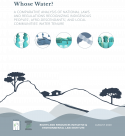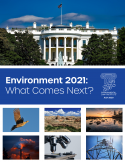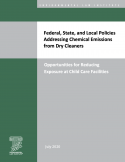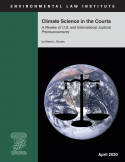
Research Reports
ELI publishes Research Reports available for free download that present the analysis and conclusions of the policy studies ELI undertakes to improve environmental law and policy. These reports contribute to education of the profession and disseminate diverse points of view and opinions to stimulate a robust and creative exchange of ideas. Those publications, which express opinions of the authors and not necessarily those of the Institute, its Board of Directors, or funding organizations, exemplify ELI’s commitment to dialogue with all sectors.
Clearly defined and legally secure freshwater tenure rights are essential to Indigenous Peoples’ and local communities’ livelihoods and food security, as well as to countries’ efforts to achieve sustainable development priorities and ensure climate resilience. However, the extent of the legal recognition of these rights to water remains largely unknown and unmonitored.
Read More >
The Trump Administration has taken dramatic and sweeping steps to remake federal environmental regulation and redefine the relationships among state and federal environmental decisions. This report, which assesses these steps, helps environmental practitioners, policymakers, and the public-at-large think about what lies ahead, looking particularly at our nation’s ability to address new problems and confront as yet unsolved challenges like environmental justice. The report identifies key categories of action affecting environmental regulation and examines some possible future outcomes.
Read More >
Dry cleaners have been a common feature of many commercial and mixed-use areas throughout the United States. Many dry cleaning facilities use tetrachloroethylene (also known as perchloroethylene, PCE, or perc), an organic solvent with well-documented health effects.
Read More >
Ocean and coastal states around the world are increasingly seeking to better utilize and benefit from their ocean environments, which can be vast in comparison to their land areas. Conflicting human uses, a changing climate, and a desire to ensure long-term sustainability compound the challenge to grow a robust “blue economy.” Consequently, countries are turning to marine spatial planning as a comprehensive management tool to assess and organize present uses of their ocean environments and map for future uses.
Read More >
Climate change has been the subject of considerable political controversy in the United States, and climate skepticism—or doubts about the basics of climate science—have not been uncommon in the public debate. At the same time, U.S. courts in several recent high-profile cases, including Juliana v. United States and City of Oakland v.
Read More >